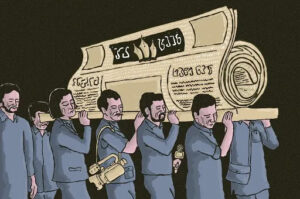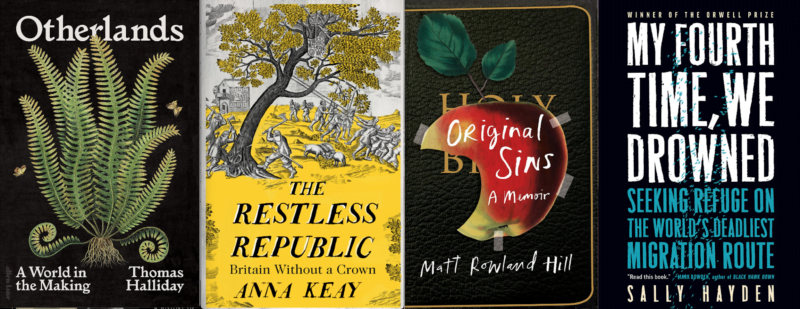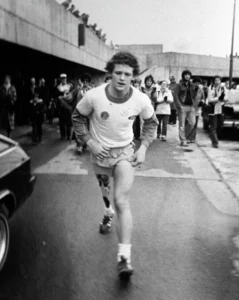
Disappearing media
This is the 199th edition of SHuSH, the official newsletter of the Sutherland House Inc.

International prize lists that will fill your reading into 2023
Sign up here to read our weekly newsletter.
Sometimes you look at a bestseller list and see a maniac like Alex Jones up there and wonder if you’re in the right business. And sometimes three great literary award lists drop in a matter of days and everything feels right with the world.
The Baillie Gifford is a UK prize that recognizes books from around the world and, for my money, the most prestigious nonfiction bauble out there.
The Financial Times Business Book of the Year always produces a long list that makes the business world seem a thousand times more dramatic and fascinating than any individual’s actual experience of it.
The National Book Award is parochial, for US authors only, but always interesting.
Here are the longlists (I’ve asterisked the FT’s shortlist.):
BAILLIE GIFFORD
Legacy of Violence: A History of the British Empire by Caroline Elkins, a Harvard Africanist who won the Pulitzer for Britain’s Gulag about the imperial experience in Kenya. “A searing, landmark study of the British Empire that lays bare its pervasive use of violence throughout the twentieth century.”
Invisible Child: Poverty, Survival & Hope in an American City by New York Times reporter Andrea Elliott, a two-time Pulitzer winner. “Follows eight dramatic years in the life of Dasani, a girl whose imagination is as soaring as the skyscrapers near her Brooklyn shelter.”
The Escape Artist: The Man Who Broke Out of Auschwitz to Warn the Worldby the Guardian columnist Jonathan Freedland. “In April 1944 nineteen-year-old Rudolf Vrba and fellow inmate Fred Wetzler became the first Jews ever to break out of Auschwitz. Under electrified fences and past armed watchtowers, evading thousands of SS men and slavering dogs, they trekked across marshlands, mountains, and rivers to freedom. Vrba\’s mission: to reveal to the world the truth of the Holocaust.”
Dinner with Joseph Johnson: Books and Friendship in a Revolutionary Ageby Daisy Day, author of Young Romantics. The story of a London bookseller who once a week played host to the likes of William Blake, Joseph Priestley, Mary Wollstonecraft, and Benjamin Franklin.
My Fourth Time, We Drowned: Seeking Refuge in the World’s Deadliest Migration Route by Sally Hayden. “A staggering investigation into the migrant crisis across North Africa… follows the shocking experiences of refugees seeking sanctuary, but it also surveys the bigger picture: the negligence of NGOs and corruption within the United Nations.”
Original Sins: A Memoir by Matt Roland Hill, a first-time author. “An extraordinarily brave memoir about faith, loss and addiction. Recklessly honest, and as funny as it is grave, Original Sins is an extraordinary memoir of faith, family, shame, and addiction. But ultimately it is about looking for answers to life\’s big questions in all the wrong places…”
The Restless Republic: Britain Without a Crown by Anna Keay, director of the UK’s Landmark Trust. “Gathering her cast of trembling visionaries and banished royalists, dextrous mandarins and bewildered bystanders, Anna Keay brings to vivid life the most extraordinary and experimental decade in Britain’s history. It is the story of how these tempestuous years set the British Isles on a new course, and of what happened when a conservative people tried revolution.”
Otherlands: A World in the Making by Thomas Halliday. “Sapiens for natural history: a stirring, eye-opening journey into deep time, from the Ice Age to the first appearance of microbial life 550 million years ago, by a brilliant young paleobiologist.”
A Fortunate Woman: A Country Doctor’s Story by writer and documentarian Polly Morland. Just like it sounds: “a compelling, thoughtful and insightful look at the life and work of a country doctor.
The Barefoot Woman, by New Yorker contributor Scholastique Mukasonga. “When Scholastique Mukasonga’s family are killed in the genocide of the Tutsis by the Hutus in Rwanda, she is unable to fulfil her mother Stefania’s wish to shroud her body with pagne. So instead, she now weaves her mother’s shroud with words, drawing on inherited traditions of storytelling to offer a devastating, unforgettable tribute.”
Super-Infinite: The Transformations of John Donne, by former children’s book specialist Katherine Rundell. “Sometime religious outsider and social disaster, sometime celebrity preacher and establishment darling, John Donne was incapable of being just one thing. He was a scholar of law, a sea adventurer, an MP, a priest, the Dean of St Paul’s Cathedral–and perhaps the greatest love poet in the history of the English language.”
Kingdom of Characters: A Tale of Language, Obsession, and Genius in Modern China, by Jing Tsu. “A riveting, masterfully researched account of the bold innovators who adapted the Chinese language to the modern world, transforming China into a superpower in the process.”
FINANCIAL TIMES BUSINESS BOOK OF THE YEAR
*Dead in the Water: Murder and Fraud in the World’s Most Secretive Industry, by Bloomberg journalists Matthew Campbell and Kit Chellel. “Digs into courtroom revelations of fraud and unsolved murder surrounding an apparent attack on a tanker, to shed light on the global shipping industry and how it is financed.”
*Influence Empire: The Story of Tencent and China’s Tech Ambition, by Bloomberg author Lulu Chen. “Tracks the rise of Tencent, developer of China’s ‘everything app’ WeChat, and its founder Pony Ma, and where they fit into the Chinese technology economy.”
*The Rise and Fall of the Neoliberal Order: America and the World in the Free Market Era, by UK-based American historian Gary Gerstle. “Looks at how the creed of free trade and free markets became embedded in the closing decades of the twentieth century and at the consequences unleashed by its neoliberal true believers.”
* The Power Law: Venture Capital and the Art of Disruption, by the previous winner of this award, Sebastian Mallaby, author of The Man Who Knew. “Examines the roots and the role of venture capitalists in the success of Silicon Valley and some of the world’s largest technology companies.”
*Chip War: The Fight for the World’s Most Critical Technology, by Tufts professor Chris Miller. “Unpicks the long supply chains that make up the complex and increasingly fragile network that builds and assembles semiconductors, and examines the implications of our global dependency on a few vast manufacturers.”
*Disorder: Hard Times in the 21st Century, by Cambridge political economist Helen Thompson. “Analyses the profound effects of recent energy volatility, which continues to provoke global tension and determine and disrupt international politics and policymaking.”
Butler to the World: How Britain Became the Servant of Tycoons, Tax Dodgers, Kleptocrats and Criminals, by Guardian contributor Oliver Bullough. \”A polemical take on how the country deployed its post-imperial institutions into the service of the corrupt super-rich. Bullough’s richly colourful contention is that London not only launders the dirty money of bad people, but also enables them to dodge the rules and make more of it.”
Direct: The Rise of the Middleman Economy and the Power of Going to the Source, by legal scholar Kathryn Judge. “Examines the sometimes dangerous growth of ‘powerful middlemen and long supply chains,’ from banks, to retailers, to real estate agents. Judge points out how the benefits also bring outsized power and makes the case for a return to more direct exchange, which improves both accountability and resilience.”
Flying Blind: The 737 Max Tragedy and the Fall of Boeing, by Bloomberg reporter Peter Robinson (a lot of Bloomberg people on this list, no?). “It is the story of the tension between profit motives and engineering excellence that, in Robison’s account, led to the fatal crashes of two 737 Max 8 aircraft in 2018 and 2019 — an outcome blamed in part on Boeing’s adherence to the efficiency-led strategies of GE’s former chief executive Jack Welch.”
Nomad Century: How to Survive the Climate Upheaval, by science writer and broadcaster Gaia Vince. “Paints a bleak picture of encroaching disaster due to unavoidable climate change, but also outlines radical solutions involving migration to the further northern and southern reaches of the globe. Vince lays out how governments, businesses, and individuals can — and must—prepare for this ‘species emergency,’ if they are to lay the foundations for the eventual recovery of the planet.”
Power Failure: The Rise and Fall of General Electric, by William D. Cohan, who won this prize in 2007 for The Last Tycoons. “He tackles the extraordinary reputational and financial fall of the conglomerate, once a seemingly impregnable bellwether for the US industrial and corporate sector. Cohan himself calls it ‘a cautionary tale about hubris, blind ambition, and the limits of believing—and trying to live up continuously to—a flawed corporate mythology’.”
Slouching Towards Utopia, by economist and blogger J. Bradford DeLong. “In vivid and compelling detail, DeLong charts the unprecedented explosion of material wealth after 1870 which transformed living standards around the world, freeing humanity from centuries of poverty, but paradoxically has left us now with unprecedented inequality, global warming, and widespread dissatisfaction with the status quo.”
Talent: How to Identify Energizers, Creatives, and Winners Around the World, by journalist Daniel Gross and blogger and economist Tyler Cowen. “Identifying underrated, brilliant individuals is one of the simplest ways to give yourself an organizational edge, and this is the book that will show you how to do that. Talent is both for people searching for talent and for those who wish to be searched for, found, and discovered.”
The Long Shot, by Kate Bingham, chair of the UK Vaccine Taskforce, and author Tim Hames. “This is an unmissable insider view into how the Vaccine Taskforce beat the odds and delivered the scientific miracle we all waited for.”
The Price of Time, historian and financial journalist Edward Chancellor. “As the global financial system edges closer to yet another crisis, Chancellor shows that only by understanding interest can we hope to face the challenges ahead.”
NATIONAL BOOK AWARD
Bright Unbearable Reality: Essays, by Soviet-born author Anna Badkhen. “Addresses the human condition in the era of such unprecedented dislocation, contemplates the roles of memory and wonder in how we relate to one another, and asks how we can soberly and responsibly counter despair and continue to develop—or at least imagine—an emotional vocabulary against depravity.”
Ted Kennedy: A Life. by political biographer John A. Farrell. “An enthralling and ground-breaking new biography of one of modern America’s most fascinating and consequential political figures, drawing on important new sources, by an award-winning biographer who covered Kennedy closely for many years.”
Uncommon Measure: A Journey Through Music, Performance, and the Science of Time, by classical violinist Natalie Hodges. “How does time shape consciousness and consciousness, time? Do we live in time, or does time live in us? And how does music, with its patterns of rhythm and harmony, inform our experience of time? Uncommon Measure explores these questions from the perspective of a young Korean American … forced to give up her dream of becoming a concert solo violinist.”
Bad Mexicans: Race, Empire, and Revolution in the Borderlands, by UCLA professor Kelly Lytle Hernández. “Bad Mexicans tells the dramatic story of the magonistas, the migrant rebels who sparked the 1910 Mexican Revolution from the United States. Led by a brilliant but ill-tempered radical named Ricardo Flores Magón, the magonistas were a motley band of journalists, miners, migrant workers, and more, who organized thousands of Mexican workers—and American dissidents—to their cause.”
The Invisible Kingdom: Reimagining Chronic Illness, by Yale Review editor Meghan O’Rourke. “A landmark exploration of one of the most consequential and mysterious issues of our time: the rise of chronic illness and auto-immune diseases… a silent epidemic of chronic illnesses afflicts tens of millions of Americans.”
South to America: A Journey Below the Mason-Dixon to Understand the Soul of a Nation, by Princeton professor Imani Perry. “An essential, surprising journey through the history, rituals, and landscapes of the American South—and a revelatory argument for why you must understand the South in order to understand America.”
Breathless: The Scientific Race to Defeat a Deadly Virus, by science writer David Quammen. “The story of SARS-CoV-2 and its fierce journey through the human population, as seen by the scientists who study its origin, its ever-changing nature, and its capacity to kill us.”
The Man Who Could Move Clouds: A Memoir, by novelist Ingrid Rojas Contreras. “[The author’s] maternal grandfather, Nono, was a renowned curandero, a community healer gifted with what the family called ‘the secrets’: the power to talk to the dead, tell the future, treat the sick, and move the clouds.”
His Name Is George Floyd: One Man’s Life and the Struggle for Racial Justice, by Washington Post reporters Robert Samuels and Toluse Olorunnipa. “Tells the story of a beloved figure from Houston’s housing projects as he faced the stifling systemic pressures that come with being a Black man in America.”
Lost & Found: A Memoir, by New Yorker staffer Kathryn Schulz. “A profound meditation on the families that make us and the families we make. But Schulz’s book also explores how disappearance and discovery shape us all. On average, we each lose two hundred thousand objects over our lifetime, and Schulz brilliantly illuminates the relationship between those everyday losses and our most devastating ones.”

This is the 199th edition of SHuSH, the official newsletter of the Sutherland House Inc.

There was an interesting piece in the New York Times a week or so ago about James Daunt (above), the incoming chief executive of Barnes & Noble, the most important bookstore chain in the English-speaking world. It didn’t quite get to the nub of the matter. Barnes & Noble has

The world of non-fiction from Sutherland House ( and Beyond )